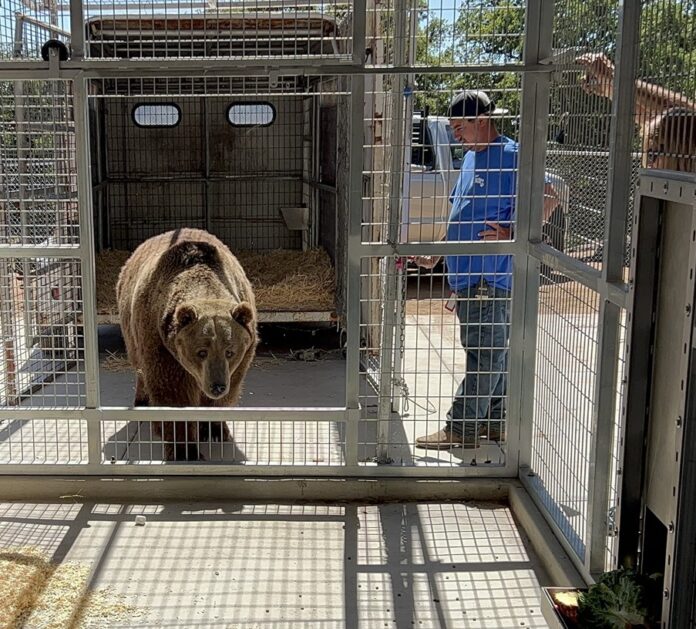Rocky the bear, who recently retired from a long career in entertainment, will be living the rest of his life at Lions Tigers and Bears, an animal rescue facility in Alpine.
The animal sanctuary is accredited by both the Global Federation of Animal Sanctuaries and the American Sanctuary Association, and typically rescues exotic animals from abusive and exploitative situations. However, sanctuary founder and director Bobbi Brink said Rocky is “truly a retirement” situation.
“This bear has been owned by the same owner for almost 18 years, he legitimately retired and Rocky was the very last animal. The owner has been boarding him for the last two years so he’s been in a small cage. Now, he gets to enjoy being a bear: he’ll have a pond for the first time, a den in the dirt and a large platform. We’re raising funds for his furniture and just his bedroom will be bigger than his old cage,” Brink said.
Rocky’s situation is unique, Brink said, as many animals simply disappear when they are too old to turn a profit. Bears are often used for cub petting when young, she said, then sold off to hunting facilities.
“A lot of people don’t know these animals can’t always be used for life in the entertainment industry. When they stop working, they disappear or end up going into a small cage for life. We’re super proud that this trainer who is retiring is also letting the animal retire with dignity,” Brink said.
She believes Rocky, a 700-pound Syrian grizzly will adjust fairly quickly to his new surroundings because he is so comfortable with people and has been socialized throughout his years in the entertainment industry. Each animal that arrives at the rescue facility has a different trajectory to settling in, Brink said, depending on “how badly they’ve been abused and what they’ve been through” and if they’ve lived in a small space.
“Rocky is a little different because he likes people, he likes to hear people talk, get attention,” Brink said.
Those qualities will make him “a good educational animal” to teach visitors why bears and other exotic animals make terrible pets. In the future, Brink would prefer to see animals eliminated entirely from the entertainment industry— ideally, she would like to see movie footage obtained in the wild, reuse of existing footage or use of fake animals.
However, the current and bigger issue, she said, is petting zoos and other attractions that rely on young animals to draw in profits.
The United States Department of Agriculture has strict regulations surrounding tiger cub handling: cubs may not be used for entertainment before they are eight weeks old because their immune systems are still very vulnerable, however it is also illegal to have those same tigers come in contact with paying customers past 12 weeks of age so there is a small window for profitable use.
Bears, she said, have an even tighter window but are not covered under the Big Cat act, a pending federal bill which would essentially ban private tiger ownership.
“We wish the Big Cat act included bears and we tried to make it happen but couldn’t get bears and primates written into that bill. We’re going to have to duplicate those efforts but in the meantime, people are starting to learn what happens to petting zoo animals. Education is key,” Brink said.
Once Rocky’s situation is established, he will be up for visitors at the rescue facility. Visit www.lionstigersandbears.org for more information on Rocky and about 60 other rescued animals at the Alpine sanctuary.














